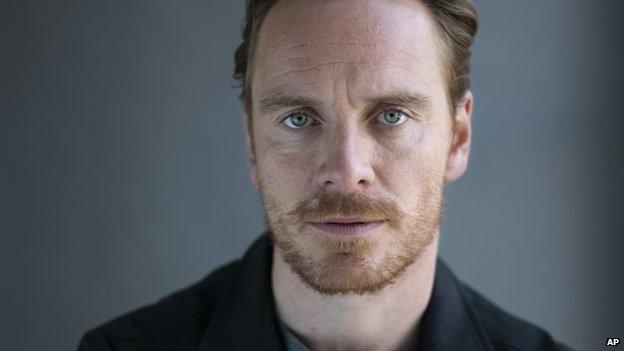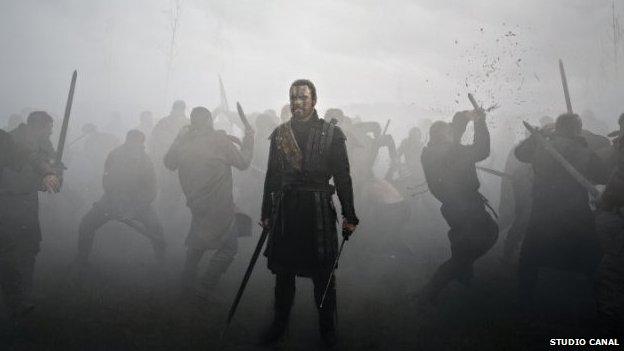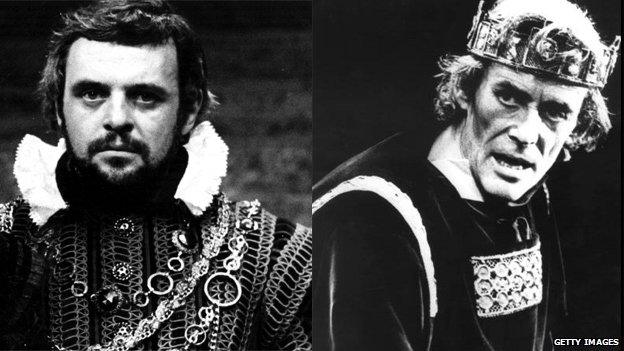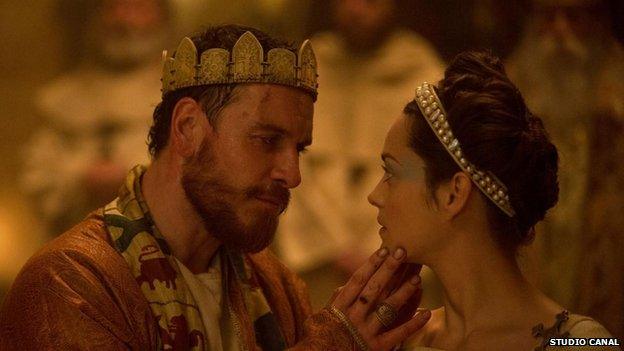Fassbender tackles 'the Scottish film'
- Published

Fassbender received his first Oscar nomination for 12 Years A Slave in 2014
"The Scottish play" - as William Shakespeare's Macbeth is known among actors - has become "the Scottish film" starring Michael Fassbender and Marion Cotillard as the infamous couple who murder their way to the throne of Scotland.
But the movie, directed by Australian Justin Kurzel and which premiered at the Cannes Film Festival this weekend, has a new interpretation of Shakespeare's tragic hero and why he sets out on his doomed path to power.
"He's suffering from post-traumatic stress disorder," claims Michael Fassbender. "I'm aware that it's a completely modern interpretation of his actions and it's only now we know what the condition is, we were just as puzzled by soldiers returning from World War One with PTSD, society didn't know what to do with them.
"I had never thought of Macbeth in that way, but Justin nudged me and said, 'it's obvious, isn't it' and it fell into place. It's actually in the text, in the banquet scene, where he sees the ghost of Banquo, Lady Macbeth has to step in and say, 'he's known to have these bouts and fits.'
"To me it all makes sense - you can't be away at war, all the time, killing people, you don't see your wife, it's in the text that they've lost at least one child, and it was the key to Macbeth for me - I understood his hallucinations, the erratic behaviour, the fits of madness. Strange how Shakespeare understood post-traumatic stress too.

Producer Harvey Weinstein has called Fassbender's performance "extraordinary"
"And to counter-balance it, I see Lady Macbeth not as the ambitious and power-hungry villainess of history, but someone who is desperately trying to reconnect with her husband and thinks that perhaps if they carry out this enormous act of murder together, it will reconnect them. I find it a more interesting theory than the power-crazy woman. It's less about power and more about filling a void."
Macbeth has been adapted several times for TV and film, including by Orson Welles in 1948, when Welles starred in the title role, and most famously, by Roman Polanski in 1971, months after the murder of his wife, Sharon Tate, at the hands of Charles Manson's gang.
'Worst luck'
This may have set the seal on the traditional superstition among actors that mentioning the name Macbeth is unlucky; Fassbender refers to it by "that name" and says that "strange things" happened among the crew during shooting.
"It very quickly became 'the Scottish play' for us, " he says. "But the worst luck we had was the weather. That was terrible."
Justin Kurzel, who made his directing debut in 2011 with independent hit The Snowtown murders, adds that there was "a supernatural element to filming in Skye in January, it seemed to be a place where spirits walk".
"We just wanted a very traditional Macbeth - one that would fit in 11th Century Scotland, not a modern re-imagining of it, set in New York or London, so that's where we went - and it poured down nearly every day of the shoot. I'm amazed the crew didn't desert us, having to carry equipment up and down the mountains every day, and these poor extras just standing in the rain in their wool costumes.
"However unlucky it might be though, we're all reuniting - myself, Marion and Michael - for the film Assassin's Creed next year, so it can't have put us off that much."

Anthony Hopkins and Peter O'Toole are among the stars who have previously played Macbeth
French actress Marion Cotillard, who won an Oscar for her performance in La Vie En Rose in 2007, believed that "one day I would play Lady Macbeth, but I thought in French, and maybe on the stage."
She was not asked to find a Scottish accent for the role, "because it gives Lady Macbeth a sense of otherness, of being an outsider. Being asked to work on delivering the original verse in English - that was the most challenging aspect of it for me."
'All afraid'
Even Fassbender, who was nominated for an Oscar for his part in Steve McQueen's 12 Years a Slave, said he was "daunted" by the thought of performing Shakespeare.
"But we were all afraid," he adds. "Me at the thought of playing a Shakespearian hero, Marion at tackling the English verses, and Justin because it was his first big feature film. The tension that created actually helped the shoot.
"I don't feel I have to do Shakespeare or anything just because I'm an actor," he qualifies, "but he's inherent in our culture and I just felt privileged at the thought of getting asked to do it. His language and his complexity - that's why he survives, there are so many avenues of interpretation to go down.
"I think it might be time for me to do something on stage soon, in a few years perhaps, but that's not necessarily going to be Shakespeare. I would like to though. I know that so many teenagers are forced to do Shakespeare for their English exams, and Macbeth is always a big favourite.
"So that's almost why I decided to do it - I hope 15 or 16 year olds are going to see it one day, and relate to Macbeth in a way they hadn't before, and see him and his wife as real people."

Director Justin Kurzel says the infamous Macbeth "curse" haunted the film's production